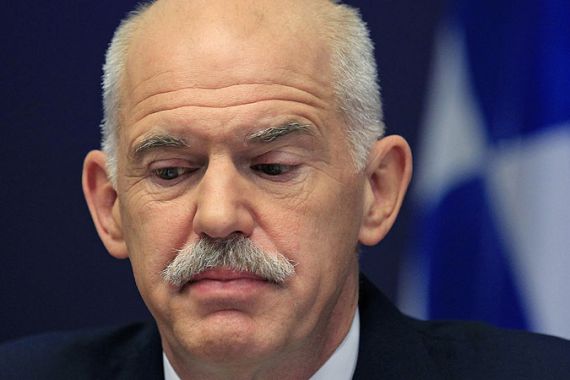Greek PM asked to explain referendum decision
French and German leaders pile pressure on Papandreou to stick to bailout deal agreed with eurozone countries and IMF.

George Papandreou, the Greek prime minister, has been summoned to meet French and German leaders in southern France on the sidelines of the G20 summit.
The development comes amid fresh concerns that plans for a Greek referendum on a EU bailout package could throw the eurozone back into crisis.
European leaders, particularly France and Germany, urged Papandreou on Wednesday to stick to the bailout package agreed with eurozone countries and the IMF, and to make up its mind fast whether it wants to stay in the eurozone.
“It would be helpful if clarity is achieved as soon as possible on which path Greece wants to take,” Wolfgang Schaeuble, the German finance minister, told the Hamburger Abendblatt newspaper.
Jean Leonetti, France’s European affairs minister, said there was no question of the eurozone renegotiating Greece’s bailout package.
Nicolas Sarkozy, the French president, and Angela Merkel, the German chancellor, discussed over telephone on Tuesday the need for rapid implementation of measures to tackle the eurozone debt crisis.
Meanwhile, EU and the IMF have been quoted as saying that further bailout funding for Greece will not be released until the referendum has been held.
Al Jazeera’s Jacky Rowland, reporting from French city of Cannes, said the European leaders are deeply unhappy with this shock announcement of the planned referendum and also the fact that it has received endorsement from the Greek cabinet.
“As far as their concern, they had a deal last week in Brussels, a deal which they see as the best possible solution to get Greek out of the current crisis and back on track towards growth,” she said.
“They feel the deal was a tough deal in that they had to secure agreement from banks to take a 50 per cent write-off on Greek debt, something not an easy to secure, and now it looks as though everything is being thrown into jeopardy as the Irish put it – a grenade has been thrown into the whole process.
Far reaching impact
“So, the purpose of the meeting would be to try to get Greece to implement this deal as quickly as possible, which will obviously mean not waiting around for referendum whose result could be very unpredictable and if it did go against the bailout, that could have a devastating and far reaching impact on eurozone as a whole,” our correspondent said.
Greece has thrown the plan’s implementation into doubt after its decision to hold referendum.
Sarkozy said the referendum announcement “took the whole of Europe by surprise”.
Jean-Claude Juncker, the chairman of eurozone finance ministers; Jose Manuel Barroso, the European Commission president; Christine Lagarde, the IMF chief; and an ECB official will also attend Wednesday’s talks with Papandeou in the southern French resort town of Cannes.
A week after 17-member eurozone countries agreed on the debt deal, Papandreou, in a surprise move on Monday, announced to hold referendum sending financial markets in a tizzy and putting a question mark on the planned 130 billion euro bailout package.
Papandreou’s decision even infuriated his colleagues and six lawmakers from his party called for his resignation, while another lawmaker defected reducing his already wafer-thin majority in the parliament.
But the Greek PM managed to get the backing of his cabinet late on Tuesday in a marathon seven-hour meeting.
Period of uncertainty
Papandreou told his cabinet that Greece’s plan to hold a referendum on the EU aid package would make clear that the country belonged in the eurozone, the 17-country bloc that uses the euro single currency, and that market turmoil triggered by the announcement would be short-lived.
“The referendum will be a clear mandate and a clear message in and outside Greece on our European course and participation in the euro,” Papandreou said, according to a statement released by his office. “No one will be able to doubt Greece’s course within the euro.”
Some ministers who attended the cabinet meeting said they had expressed criticism of the decision but decided to support the government at the confidence vote in parliament on Friday.
Even if he wins the confidence vote, the eurozone faces a period of uncertainty leading to more market turmoil.
If he loses, Greece would face a default which would hammer Europe’s banks and threaten the much larger economies of Italy and Spain, which the euro bloc may not have the means to bail out.
The recapitalisation of banks is one prong in the eurozone plan to reassure investors that larger European countries would not fall into the same debt hole that has already sucked in Greece, Portugal and Ireland.